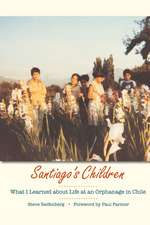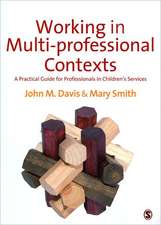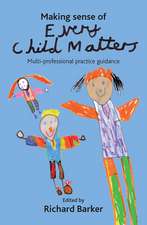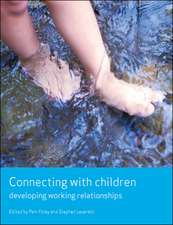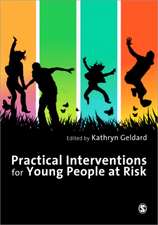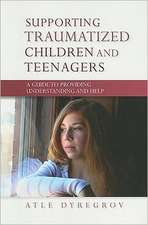Well-being, Poverty and Justice from a Child’s Perspective: 3rd World Vision Children Study: Children’s Well-Being: Indicators and Research, cartea 17
Editat de Sabine Andresen, Susann Fegter, Klaus Hurrelmann, Ulrich Schneeklothen Limba Engleză Hardback – 7 aug 2017
| Toate formatele și edițiile | Preț | Express |
|---|---|---|
| Paperback (1) | 475.59 lei 38-44 zile | |
| Springer International Publishing – 4 aug 2018 | 475.59 lei 38-44 zile | |
| Hardback (1) | 641.89 lei 38-44 zile | |
| Springer International Publishing – 7 aug 2017 | 641.89 lei 38-44 zile |
Din seria Children’s Well-Being: Indicators and Research
- 5%
 Preț: 1103.22 lei
Preț: 1103.22 lei - 15%
 Preț: 649.06 lei
Preț: 649.06 lei -
 Preț: 391.99 lei
Preț: 391.99 lei -
 Preț: 396.24 lei
Preț: 396.24 lei - 18%
 Preț: 730.16 lei
Preț: 730.16 lei - 15%
 Preț: 703.38 lei
Preț: 703.38 lei - 20%
 Preț: 570.97 lei
Preț: 570.97 lei - 20%
 Preț: 578.30 lei
Preț: 578.30 lei -
 Preț: 389.70 lei
Preț: 389.70 lei - 20%
 Preț: 514.27 lei
Preț: 514.27 lei - 5%
 Preț: 712.81 lei
Preț: 712.81 lei - 20%
 Preț: 553.18 lei
Preț: 553.18 lei -
 Preț: 397.16 lei
Preț: 397.16 lei - 20%
 Preț: 481.40 lei
Preț: 481.40 lei - 18%
 Preț: 1110.86 lei
Preț: 1110.86 lei - 18%
 Preț: 891.48 lei
Preț: 891.48 lei -
 Preț: 363.57 lei
Preț: 363.57 lei - 18%
 Preț: 895.76 lei
Preț: 895.76 lei - 5%
 Preț: 1416.81 lei
Preț: 1416.81 lei - 5%
 Preț: 711.32 lei
Preț: 711.32 lei - 18%
 Preț: 945.79 lei
Preț: 945.79 lei - 5%
 Preț: 715.00 lei
Preț: 715.00 lei - 18%
 Preț: 947.35 lei
Preț: 947.35 lei - 5%
 Preț: 912.67 lei
Preț: 912.67 lei - 5%
 Preț: 722.12 lei
Preț: 722.12 lei
Preț: 641.89 lei
Preț vechi: 844.59 lei
-24% Nou
Puncte Express: 963
Preț estimativ în valută:
122.86€ • 133.50$ • 103.27£
122.86€ • 133.50$ • 103.27£
Carte tipărită la comandă
Livrare economică 17-23 aprilie
Preluare comenzi: 021 569.72.76
Specificații
ISBN-13: 9783319575735
ISBN-10: 3319575732
Pagini: 108
Ilustrații: XXIII, 228 p. 50 illus., 46 illus. in color.
Dimensiuni: 155 x 235 x 19 mm
Greutate: 0.56 kg
Ediția:1st ed. 2017
Editura: Springer International Publishing
Colecția Springer
Seria Children’s Well-Being: Indicators and Research
Locul publicării:Cham, Switzerland
ISBN-10: 3319575732
Pagini: 108
Ilustrații: XXIII, 228 p. 50 illus., 46 illus. in color.
Dimensiuni: 155 x 235 x 19 mm
Greutate: 0.56 kg
Ediția:1st ed. 2017
Editura: Springer International Publishing
Colecția Springer
Seria Children’s Well-Being: Indicators and Research
Locul publicării:Cham, Switzerland
Cuprins
Chapter 1. Summary.- Chapter 2. How Children See Well-Being, Poverty, and Justice: The Focus of the Third World Vision Child Study (Andresen).- Chapter 3. What’s Fair and What’s Unfair: The Different Faces of Justice (Schneekloth).- Chapter 4. Family Backgrounds: Great Variety but Also Marked Differences in Life Conditions (Pupeter).- Chapter 5. School: An Increasingly Important Field of Experience (Pupeter).- Chapter 6. Friendships Among Peers (Jäntsch).- Chapter 7. Codetermination and the Children’s Own Opinion (Schneekloth).
Notă biografică
Sabine Andresen is a proven expert in research on childhood and youth. She has presented historical and discourse analytical works, e.g., on the relation between childhood and politics. One main focus of her research lies on the well-being of children from an international perspective as well as on the threat to childhood by poverty and precarious life situations. In her empirical qualitative research, also on the family, and in her quantitative surveys she analyses the actors’ views and their intertwining. Since 2009 she is a board member of the International Society for Child Indicators (ISCI) and member of the committee of experts of the Federal Ministry of Families, Senior Citizens, Women, and Youth (BMFSFJ).
Susann Fegter is an expert in research on education, childhoods and gender. She has presented qualitative and discourse analytical works, e.g. on urban childhoods, on boys in the educational system and on child well-being. One main focusof her research lies on methodological questions of cultural approaches in educational and childhood studies and on questions of subjectivation. She is one of the principle investigators of the multinational qualitative study “Children´s Understandings of Well-being – Global and Local Contexts” (CUWB) which is an ISCI endorsed project with research partners in 25 countries worldwide.
Klaus Hurrelmann is Professor of Public Health and Education at the Hertie School of Governance. His areas of research include health and education policy. Hurrelmann was the founding dean of the first German School of Public Health at the University of Bielefeld. There, he spent 12 years as Director of the Research Center SFB 227, "Prevention and Intervention in Childhood and Adolescence". Hurrelmann led the German contribution to the international comparative study "Health Behaviour in School Children" for the World Health Organization from 1992 to 2006. He is in the directorial team of several ongoing national surveys covering the development of family, children, youth and young adults. Previously, Hurrelmann was a Professor of Socialisation at the Universities of Essen and Bielefeld. He was educated as a social scientist at the University of Münster and the University of California, Berkeley. He earned his doctorate in the field of Education Systems and Society.
Ulrich Schneekloth is an empirical social researcher with wide experience in methodology and methods of representative surveys. His main focuses are research in generation relations, social change and participation. He has conducted several surveys on family, childhood and youth. Together with Sabine Andresen and Klaus Hurrelmann he has founded the World Vision Children Study. In addition he is one of the responsibles of the German Shell Youth Study.
Textul de pe ultima copertă
This book presents evidence that children are the real experts of their lives. 2600 boys and girls in Germany between the ages of 6 of 11 years, with and without a migration background, were interviewed. Next to established topics of family, friends, leisure time and school, the focus of this study was on the topic of justice. Children were asked what justice in their opinion was and whether they felt treated justly or not. The 3rd World Vision Study puts the subjective well-being of children into the focus and shows that children are able to report competently and authentically about their lives. This volume is of great important to researchers, policy makers and professionals interested in children’s well-being from children’s own perspectives.
Caracteristici
Presents research conducted with children aged 6-11 years on their well-being The first study on child well-being from the perspective of children Presents evidence that children are the real experts of their own lives

